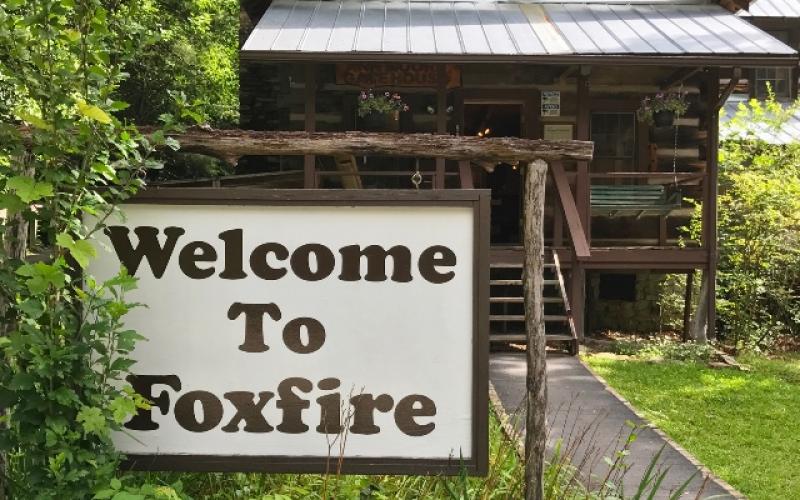By T.J. Smith, executive director of the Foxfire Museum and Heritage Center

Back in January, my co-host on the It Still Lives Foxfire podcast, Kami Ahrens, and I thought it relevant to focus our January episode on interviews from Foxfire’s archive about the local response to the 1918 Flu Epidemic. At the time of our decision, everyone was bracing for the annual flu season and Kami and I thought that folks might appreciate a look into our past and how communities of old handled the threat of communicable disease. Little did we know how relevant that material would be just a month later.
As we all navigate the difficulties of COVID-19 – the social distancing and self-isolation, the paranoia and anxiety – I thought it might be good to share something to provide us all with a little perspective, and I wanted to share this reminder: while we may be forced to keep our distance physically, let us not distance our hearts. It truly does take community to see us through these trying times.
Check in on your elderly neighbors with a phone call or a note and a care package left on their porch. Call your parents. Keep your kids close, but also don’t be afraid to keep them outside when the weather allows it. Keep them scrubbed, but don’t keep them imprisoned.
As we retreat to social media to supplement our normal gathering practices, remember that the folks you are interacting with online are the same folks that you call “neighbor” – these are the folks we chat with in the grocery store and with whom we used to dine at our beloved downtown haunts. Just because you can’t see them, doesn’t mean you can’t wound them.
Finally, find ways to support our local businesses, whether it be ordering curb-side pick-up from your favorite restaurants or ordering a toy, or a shirt, or tool online from one of our many wonderful stores and shops. Stay safe, stay well, and stay hopeful.
Now, as promised, here are some memories from that awful epidemic some 100 years ago that killed somewhere between 17 and 50 million people worldwide.
ETHEL CORN
[…] Back in them days, the neighboring people went in and done for the sick and set up beds, and took care of ’em. Nowadays, if anything’s wrong with ’em, ye take ’em to the hospital, but back then they wasn’t no hospitals. People helped each other then. They visited neighbors that was sick or anything. The house was always full.
S. F. LEDFORD
We was all down with it. We lived next to Willey Burton, and of a mornin’ he’d come and feed fer me. He’d just come up to the barn—wouldn’t come on in the house. Then in about two weeks he come down with it, and I had to go and feed fer him. But that flu was bad back then, brother. Ever’one in Clayton had it. People wouldn’t go in the houses. They’d bring us food and put it on the porch. They wouldn’t come in the house. They claim it came from the Army, y’know. From the war.
BESSIE KELLY
People would wear masks over their faces, and cut wood for people and put the wood on their porches. The neighbors would go look after the sick people’s cattle. The flu makes your head feel as big as a wash pot and made you sick at your stomach. People would talk crazy talk.
ADA KELLY
Folks wouldn’t go in the sick people’s homes for fear of catching it, too. Folks would go outside the house and put the wood and the groceries and things like that on the sick folks’ porches. And then they’d go back and look after themselves because some of the folks that helped the sick folks were sick, too. You know, we’ve always had good neighbors in Rabun County and Macon County; I mean they sure do take care of the sick folks.
LILLIE CANNON
[…] Later, when anyone in the community took flu, they’d come for me to nurse them because I had had it and survived, so people seemed to think I knew more about it than the doctors. I just used the ice cap, hot water bottles, raised all the windows, spread blankets on chairs around the bed to keep drafts off the patient, and I laughed with them when they told some funny joke. I let them do the talking because I knew how it was to try to listen with one’s mind wandering or going blank.
HAPPY DOWDLE
I had it. It kinda hit our settlement up yonder. If one in the family took it, seemed like ever’body got it. Boy, she was rough then. But the neighbors would go right in and take over—milk their cows and feed ’em and tend to the stock and do the cookin’ just like it is at home. This is the best county fer this I ever saw. This county has always been noted fer that. […]
To hear more on this and other topics from the Foxfire archive, search for It Still Lives wherever you get podcasts. You can also visit www.foxfire.org/journal/ to get access to the podcasts and other materials to occupy your time as we all do our best to slow the spread of COVID-19.
T.J. Smith is the executive director of Foxfire, Inc. in Mountain City.

